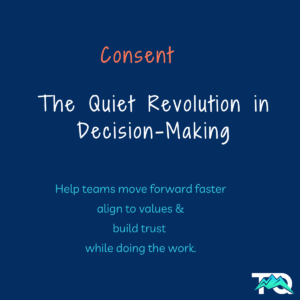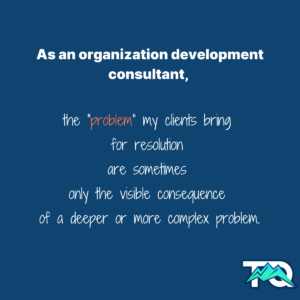Mistakes. Apologized for–or not–mistakes happen all the time in workplaces. It’s what we do with those moments that can define a person’s–and a team’s–willingness to learn from the moment. Too often in the workplace, we categorize rumination on past mistakes as a negative activity.
Consider this instead: when done well, leaders can create space for generative rumination.
Because ruminating on the past allows acknowledgement and validation, a willingness to move forward naturally follows. Incorporating lessons learned and aspirations, leaders can create spaces that enhance these natural human behaviors and harness that for competitive advantage.
We know from extensive organizational research that high-performing organizations have a much deeper connection and better self-righting mechanisms than their peers, which leads to individuals–all employees, not just managers–sustaining growth over time and often demonstrating high levels of self-mastery (Pir, 2021, p. 35).
The argument for deliberately developing employees across organizations sits solidly on this list of benefits: increased profitability, improved employee retention, better communication, less interdepartmental strife, and faster solutions to tough problems, such as how to create valuable leadership and realize future possibilities as well as how to anticipate crises. (Shafer, 2016, para. 5)
Five components comprise this concept of “Deliberately Developmental Organizations” – we’ll focus on one tool–the Debrief–which links four of the five components; practices that
- shed light on internal struggles to overcome those obstacles.
- connect professional and personal work to incorporate feedback and coaching as a fundamental part of every meeting.
- shift the focus from outcomes to the mindset behind the behavior and thereby the processes generating those outcomes.
- give employees a common language to build shared understanding and community
Debriefing can boost team performance up to 25%, when applied correctly (DebriefNow, 2025). Also known as the After Action Report, the Debrief requires four simple yet impactful components:
- the Debrief Facilitation Mindset
- Guiding the Conversation
- Participation Agreements; and
- Clarifying Next Steps *and why they matter.*
Numerous examples exist from research: law enforcement teams and correctional officers used guided self‑correction to improve on‑duty procedures. Facilitators prompted officers to identify when teamwork worked—or didn’t—during critical incidents, based on an expert teamwork framework, and to implement agreed‑upon improvements (DebriefNow, 2025).
Or in my own experience: I have both incorporated this as a people manager for small teams I directed and participated as a peer with a group of 10 Directors. In doing so, we made it commonplace to make sense together of the circumstances of a situation. We used those shared learnings as a springboard to take action.
At this point, maybe you’re thinking: sounds great in theory, but in practice–when is there time for this?!
Leaders, the excitement and speed behind your energy to take action can be a double-edged sword when not wielded correctly. Debriefing can fit into your rapid work process to go to market and post-deal. Consider applying it after a portfolio company’s earnings calls; integration milestones; and leadership team collaboration.
Dedicate only 10 minutes at the end of team and project meetings for a pilot period (3-4 meetings, 3 months; etc) – instead of a full 30 or 60 minute Debrief-focused gathering.
Aim for concision. Choose 1-3 different items to focus on every few weeks. This micro-moment allows the team to pause from thinking about task progress and instead to focus on collaboration and teaming.
**This article is also visible in Lodestone People Consulting’s July 2025 newsletter.
REFERENCES
Pir, S. (2021). *Human-centered leadership*. SESIL PIR Consulting GmbH.
Karakas, F. (2010). Spirituality and performance in organizations: A literature review. *Journal of Business Ethics, 94*(1), 89–106. https://doi.org/10.1007/s10551-009-0251-5
Weick, K. E., Sutcliffe, K. M., & Obstfeld, D. (2005). Organizing and the process of sensemaking. *Organization Science, 16*(4), 409–421. https://doi.org/10.1287/orsc.1050.0133
DebriefNow. (2025, June 18). Summary of Smith-Jentsch, K. A., Cannon-Bowers, J. A., Tannenbaum, S. I., & Salas, E. (2008). Guided team self-correction: Impacts on team mental models, processes, and effectiveness. Small Group Research, 39(3), 303–327. Retrieved from https://www.debriefnow.com/what-is-a-debrief/do-debriefs-work/
DebriefNow. (n.d.). Do debriefs work? Retrieved June 15, 2025, from https://www.debriefnow.com/what-is-a-debrief/do-debriefs-work/
Shafer, L. (2016, April 14). Deliberately developmental. *Usable Knowledge: Harvard Graduate School of Education*. https://www.gse.harvard.edu/ideas/usable-knowledge/16/04/deliberately-developmental
Tannenbaum, S. I. (n.d.). Effective debriefs. The Group for Organizational Effectiveness, Inc.
Shafer, L. (2016). Deliberately developmental. Harvard Graduate School of Education.


